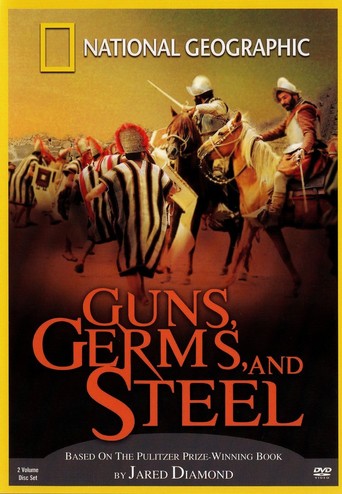

Guns Germs and Steel (2005)
A PBS documentary concerning Jared Diamond's theory on why there is such disparity between those who have advanced technology and those who still live primitively. He argues it is due to the acquisition of guns and steel and the changes brought about by germs.
Watch Trailer
Cast


Reviews
Plot so thin, it passes unnoticed.
Am I Missing Something?
At first rather annoying in its heavy emphasis on reenactments, this movie ultimately proves fascinating, simply because the complicated, highly dramatic tale it tells still almost defies belief.
This is a gorgeous movie made by a gorgeous spirit.
"Guns, Germs and Steel" If he says it often enough, does he think we will believe it?This is probably the most thinly documented "documentary" that I have ever seen.There are no contributors, pro or con, other than Mr. Diamond. There are no citations of scientific studies, and there no inquiries into the deficiencies or contradictions of Mr. Diamond's hypothesis.We are left with only Mr. Diamond's opinions and observations.Travelling to New Guinea 30 times birdwatching does not suffice as science when attempting to explain the growth of European empires.Mr. Diamond appears to be an agreeable man, and his comments are interesting, but he demonstrates that he is a lax scientist and a very poor marksman.This series should be titled "My Travels in New Guinea."National Geographic has damaged their credibility and, therefore, their brand with this series.Although the cinematography is beautiful, and the sets and costumes are relatively lavish, I can rate it only 2 stars because of the lack of rigor in the research presented.And the answer to the question posed on the beach: Because they made it.
As much as I enjoyed this film, my enthusiasm was dampened by the fact that most of Diamond's revelations are ideas that were in circulation as far back as a hundred years ago.I couldn't help but wonder why someone so well-versed in history & anthropology would be triumphant about the "discovery" that Europeans used smallpox to wipe out Native Americans, that guns helped Europeans conquer Africa, or that malaria made it impossible for Europeans to migrate into the center of Africa in large numbers.Furthermore, his explanation ignores the social, economic & political dimensions of world conquest by Europeans, not to mention the ethical & religious implications of past and present conquests and inequalities, chalking it all up to the impersonal forces of luck and "geography".His reaction to witnessing the horrors of disease-ridden African children is startlingly naive, leaving one with the question: Why did Europeans set out to conquer Africa, killing hundreds of millions of people in order to spread out & enrich its economies, rather than do the same thing to China?? The Chinese invented gunpowder and had cannons before Europeans even heard of guns. Furthermore, they had a far greater population, a more advanced technology, & more efficient agriculture.The answer lies in certain structures within European society. Until we figure out what this is and how it still manifests itself in our world, we will never be able to understand why inequality still exists in our world. Nevertheless, Jarred Diamond's optimistic conclusion is sincere. One can see how much he wants a better world.~NN
This series adds new information and background to the book and includes personal appearances by the author and by archaeologists and other anthropologists. It brings the book to life and makes even more sense of the author's subsequent opus, *Collapse*.Diamond himself comes off as personable and caring, not just a disinterested or disengaged academic. This series makes it clear that his book was not just a response to a need to "publish or perish," as the saying goes about academe, but a deeply considered answer to a question from someone he respects, "Why you white people got so much cargo, and we have so little?" Because he respected the intelligence of the questioner and his community, Diamond looked for an answer that didn't insult that intelligence or that community. I like to think of his answer in a very simple way, in the same spirit as "South Park's" "Blame Canada": "Blame wheat!"
Having read Diamond's book, I was slightly disappointed in the series, but all in all, it is quite informative. Reading the other comments, it is comforting to know that the 'culture warriors' are hard at work, seeing 'attacks' on 'Western Civilization' under every rug.Is Diamond a little preachy ? Sure. Like a lot of academics, he sees his theory as the most important thing ever. He uses the phrase 'guns, germs, and steel' at seemingly every opportunity during the series. We get it, after about the first 10 minutes.Is Diamond a little simplistic (in the series) ? Sure. The part about the Spaniards in South America is particularly amusing, condensing some very long, complicated history down to 'smallpox, swords, and horses', wrapping up the whole conquest of South America in about 15 minutes. But the point remains valid - these things did in fact contribute (but not totally define) the reasons for the Spaniard's success against the established cultures.Is he preaching *against* Western Civilization in any way ? Nope. Not a word. Not to my ear. All he says is that luck played a large part in determining which cultures advanced more quickly, *not* that luck is the only reason.In the end, if you're looking for something that validates your own sense of superiority, then this series is not for you. But if you are interested in all of the factors than influence how societies succeed or fail, this series presents a useful interpretation of the historical evidence.

